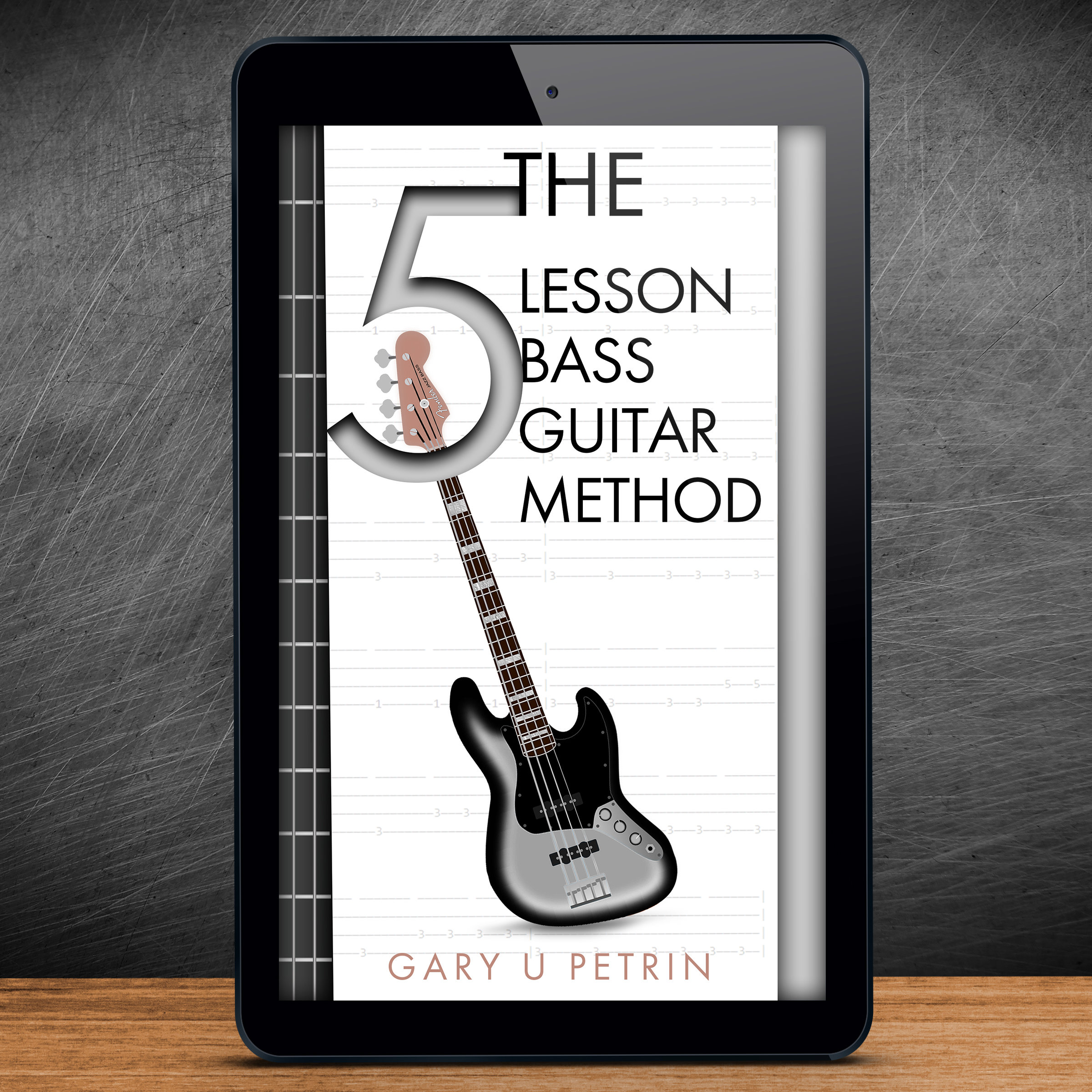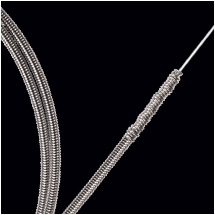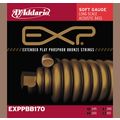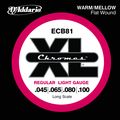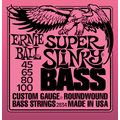Bass Strings
Choosing bass strings is a “subjective” process, and for a beginner it could be a very lengthy process. Just because certain bass strings feel good and sound good to one bass player – it doesn’t mean that they will feel good or sound good to you. To get started, you should talk to other bass guitarists to see what they are using, but don’t stop there. If you are in the beginning stages of playing the bass – you should try different brands, sizes, and types until you find what works best for you when choosing bass strings.
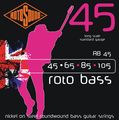 |
 |
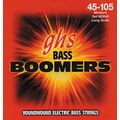 |
Some “Realistic” reasons for choosing bass strings:
a) They “Sound” great to you (you are getting the tone that you are looking for from these strings).
b) They “Feel” great on your fingers (they have a good feel, do not cause any “discomfort” when playing).
c) Finger noise is minimal or barely noticeable…
Note: If the strings “Sound” and “Feel” great to you, then how much they cost should not be a reason why you don’t use the strings. Don’t sacrifice play-ability and tone.
Once you select a particular type of string there is one other thing that will enter into the selection process (or not?) – All strings are not the same as far as their “Life” (how long they will stay sounding good and feeling good). You may come to find that you are replacing your strings too much, and it’s starting to get expensive. At this point you’ll have to decide on either staying with these strings – or finding a brand of strings that lasts longer…
Some “Un-Realistic” reasons for choosing bass strings:
a) They only cost $6.00 per package (what a bargain!).
b) Geddy Lee of Rush uses this brand and size, I want to be like Geddy.
c) All my bass guitarist friends use this brand of strings, so should I?
d) I can’t tell the difference anyway
All not so good reasons for choosing bass strings, but all good examples of how not to choose bass guitar strings (especially if you are serious about playing).
Let’s talk “Technical” about Bass Guitar Strings:
Bass String Construction
Bass strings are basically comprised of two strings – a core string and then a winding string. The core string will be a thick wire, and the winding string will be tightly wound the core string in a spiral (all the way up the core string). These windings create little grooves all the way up the string. The winding is what adds “brightness” to the string’s tone.
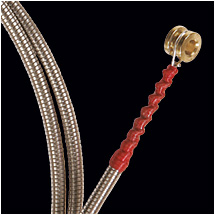
Materials Used
The materials used to make bass strings are very important. For example – bass strings made with nickel-plated steel (called nickel-wound bass strings) will get a more clear, captivating type of tone (this is the string type preferred by rock bassists).
Bass strings made with stainless steel will get a smoother feel to them (and also helps to reduce finger noise). Stainless steel strings will also have more “sustain” to them than nickel-plated steel strings.
String Gauges
When we talk about the Gauge of the string we are referring to the “diameter” of the string (the thickness of the string) – the larger the string number, the thicker the string will be. Common sizes are .45 (medium) and .40 (smaller gauge) for the “G” strings. The smaller gauge string (.40) will feel lighter on the fingers, but will have a different tone (less thickness). The lighter gauges will have a “brighter” sound, be easier to play, but the setback will be less “tone.” The medium gauge string (.45) will be thicker, and will provide “thicker” tone (but may be a little harder on the fingers). It would be a very good idea to try both sizes for yourself. Beginners like the .40 set (easier on the fingers), while more advanced players like the .45 set (for the tone) – you need to decide which size is best for you.
There are many different brands, types, materials, and sizes to choose from. For example – a medium gauge set of bass string sizes can be .45, .65, .80, and 100 while a “light” gauge set of bass string sizes can be .40, .60, .80, and 100. Again, it’s best that you try the different brands and types until you find what “feels best” and what “sounds best” to you.
A typical way to ask for a pack of bass strings at a music store is
“I would like a pack of GHS Boomers, size 45 – 100 (or 40 – 100).”
On each package of strings they always list the string sizes (for all four strings). So take a moment to review the sizes before you purchase the strings to make sure you know what you’re getting.
Note: It usually takes a little bit longer to “break in” bass guitar strings, but you won’t have to change them as much (as compared to guitar strings).
Bass String Types
There are two main types of strings used for bass guitars – Roundwound and Flatwound. And then there are a few other types of bass strings that fall in between Roundwound and Flatwound which are Half-Round and Groundwound.
Roundwound Bass Strings
Roundwound bass strings are the most used type of bass string, and used in all the different styles of music. The Roundwound string is similar to guitar strings, but are much thicker. They are more durable and less prone to breakage. They have a “brighter” sound, and greater “sustain” as compared to flatwound strings.
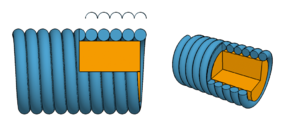
(courtesy of Wikipedia)
Roundwound strings have more “grooves” in them so there will be more finger noise, and they will also feel a little “rougher” than Flatwound strings. Since there are more grooves in the strings, Roundwound strings usually have a shorter playing life than Flatwound strings.
Flatwound Bass Strings
Flatwound strings are well liked by jazz and reggae bass players since they have a smooth, mellow, and damped sound to them. There is very little “finger noise” since there are fewer grooves on the strings.
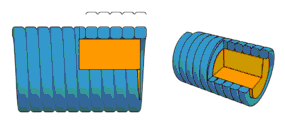
Flatwound strings are specially wound and polished to have smoother surfaces, and tend to last longer than Roundwound strings since there are fewer grooves (less places where dirt and oil can build up on them).
Half-Round Bass Strings
A Half-Round has kind of an oval-shaped winding, and are partially ground. They are pretty much a “cross” between Roundwound and Flatwound strings.
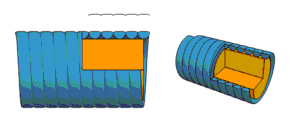
(courtesy of Wikipedia)
Half-Round strings provide the “brightness” of Roundwound strings, and the “feel” of Flatwound strings.
Groundwound Bass Strings
Groundwound strings are made in the same basic manner as Roundwound strings. Groundwound strings are smoother to the touch than Roundwound strings, but are not as smooth as Flatwound strings. The tone of Groundwound strings will have much of the same brightness and sustain as with round wound strings, but will produce less string noise (much like Flatwound strings).
Maintenance / String Cleanliness / Age
Dirt and oil will eventually build up on all bass guitar strings, and then the strings will need cleaning (or after several cleanings, need replacement). When strings become dirty, they start to lose their brightness and start to sound duller.
THE FASTEST WAY TO CLEAN YOUR STRINGS…
The “fastest and easiest” way to quickly wipe down your strings is to use a “lintless” type material and simply wipe down each string – one at a time
Wiping Down your Strings – Example – Click Here!
(this example shows an electric guitar, but the principle is the same for the bass).
The Best way to clean your strings…
The best way to clean your bass strings is to use denatured alcohol or purchase the cleaning solution sold in music stores by string manufacturers. If you use denatured alcohol to clean your strings, you will get very good results.
Warning – Denatured Alcohol is poisonous and flammable – Use Caution! Also use rubber gloves and wear protective eyewear. Most of all, make sure the area you are using is well ventilated (use your garage, shed, or go outside to perform the cleaning.
Cleaning the strings – is easy (but lengthy), you simply remove your strings, and soak them in denatured alcohol for about 15 hours (or longer). Then just wipe them off with a t-shirt type material, re-install them, tune up, and they should sound like new.
* Remove the strings! Do not clean your strings in place (on the bass) because the denatured alcohol could harm the finish on your bass guitar.
Important Note: A set of strings will only take so many cleanings before they will need to be replaced. So be aware that there will come a time when cleaning just won’t work anymore, and your only option will be to replace the strings.
Do not replace just one string (unless you are in an emergency situation).
Does boiling your strings in water work?
To some degree, boiling your strings in water will work, but it’s not exactly very reliable. Yes, it may temporarily add some life back into your strings, but the strings will quickly go back to the way they were (you may get a few days out of this technique). The best way to clean your strings is to soak them in denatured alcohol as stated above – or just replace them completely. But, never boil your strings in water – water and metal just don’t mix very well…
Final Suggestions / Notes
There are expensive bass strings, and there are some really cheap bass strings, you get what you pay for when choosing bass strings. If you want a quality bass tone from your strings, you’re most likely going to have to buy quality bass strings. As you’ve read above, tone is very dependent on the string type and construction, and the age of the strings will have a big effect on the strings sound.
|
|
|
|
The information covered here is intended on to assist you with some basics of choosing bass strings. You should always make the final decision on choosing bass strings that you use – and that decision should be mainly based on the “Feel” and “Sound” of the strings.
Here are a couple suggestions / tips:
a) Try out as many types of strings as you can before making a final decision choosing bass strings.
b) Talk to other guitar players to see what they are using.
c) Talk to the guitar salesman at music stores for some additional advice when choosing bass strings.
It may take a lot of “trial and error” until you find the strings of your dreams, but it will be worth all the time and effort (especially when you find exactly what you have been looking for).
Check this out…
1. Fast Fret – A specially formulated glide-on mineral oil product that you wipe on your strings – helps your fingers glide easier (makes the strings feel faster), cleans the strings at the same time prolongs fingerboard life.
Fast Fret – Try it, you’ll like it.
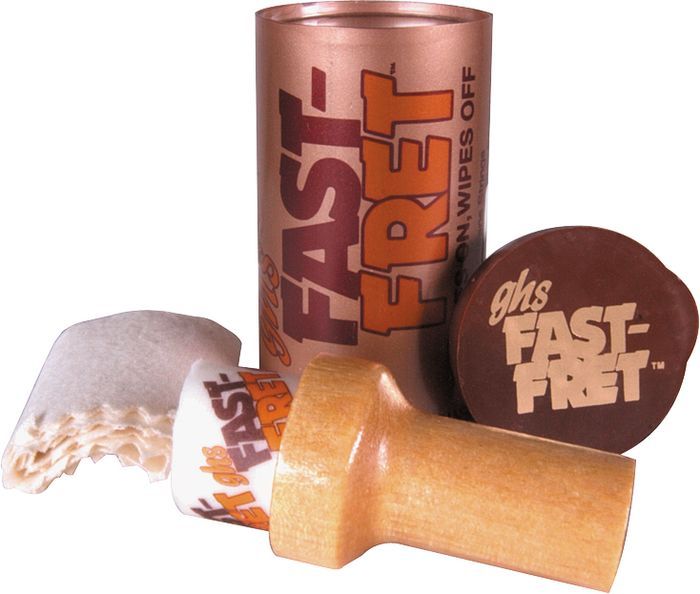
Cost is anywhere from $4 up to $8.
2. String Winders – Replace your strings as often as you need to (could be once every 2 weeks, or once a month) it all depends on how your strings sound and feel. When you replace your strings try this “string winder” device (see picture) to assist you when you replace your strings – it’s faster, helps make a tighter winding on the strings, and is easier on the hands.
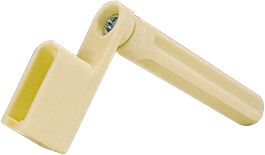
Cost is anywhere from $2 up to $6 (the $2 one works just as well as the $6 one).
String Winder – Video Clip Example – Click Here!
Example shows the string winder being used on an electric guitar, but it works the same on a bass…
COMMON MISTAKES MADE BY BASS PLAYERS!
